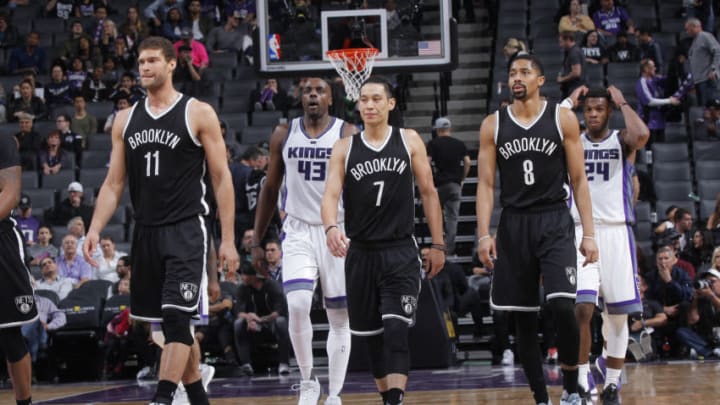Brooklyn Nets: Clearing up the crowded backcourt
By Alec Liebsch

Now that the bulk of free agency has slowed down, teams can start to move pieces around again. Here are some potential trades for the Brooklyn Nets to clear up their guard rotation.
The Brooklyn Nets aren’t good yet, but they certainly have pieces. Unfortunately, the majority of those pieces are condensed into one positional group: the backcourt. After looking over the guard rotation for next season, there’s a very evident logjam as of now.
Between D’Angelo Russell, Spencer Dinwiddie, Jeremy Lin, Caris LeVert, Allen Crabbe, Joe Harris, and possibly Isaiah Whitehead too, something has to give. Not everyone can play given the current population of guards, even if they deserve to. Sliding LeVert, Crabbe or Harris down to the 3 (and even the 4 in LeVert’s case) only works in spurts; Crabbe and Harris aren’t exactly lockdown defenders.
This means that someone probably has to go. Everyone needs to play, and trading any of these pieces won’t be easy.
Russell is not a trade candidate right now; his value is quite low relative to his potential. Why would the team give up on its most upside-laden player? Russell was the No. 2 pick as recently as 2015. His potential as a bucket-getting, high-I.Q. elite guard is still tangible, and the return for him at this moment would not suffice for his prospective.
Harris was just re-signed, and shouldn’t go anywhere. Everyone needs shooters, especially the team with the second-happiest 3-point trigger in the league. His contract could become valuable to contenders, but what he would…net…on the trade market undermines his on-court value to Brooklyn.
More from Brooklyn Nets
- Why the new-look Brooklyn Nets are guaranteed to surprise
- NBA Trades: This Mavs-Nets deal may lead to Dallas adding a third star
- 5 NBA players everyone should be keeping a close eye on in 2023-24
- 5 NBA players facing do-or-die 2023–2024 seasons
- Is Mikal Bridges the Brooklyn Nets next star?
LeVert is a valuable and malleable player the Nets should hold close to the vest. He does so many things well, and is Brooklyn’s Swiss army knife as a result. He is a building block going forward, as he bridges the skill-set gap between the other two supposed cornerstones, Russell and Jarrett Allen. Whether he turns into a great player is not exactly the point; it’s the potential of him doing so that should keep him protected.
Crabbe is virtually untradeable because of his contract. His combined $35 million owed over the next two seasons (assuming he picks up his player option for 2019) is not going to be incurred by anyone. Additionally, he has a 15 percent trade kicker, which would take his total to $40.3 million through 2020.
The only reason the Nets were willing to absorb Crabbe’s albatoss contract was because they had sufficient cap space. They had this cap space because the first time they tried to acquire him in 2016, the Portland Trail Blazers matched the offer sheet. The Nets wanted Crabbe, and they won’t be offloading him just to relieve themselves of salary.